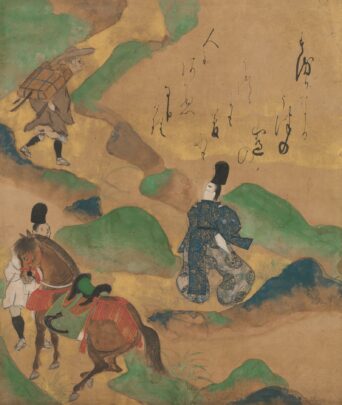
Japanese Poetry: Beyond the Haiku
- 29 November 2021
- 16:00 - 17:30 (GMT)
- Online
- https://dajf.org.uk/event/japanese-poetry-beyond-the-haiku
- events@dajf.org.uk
- Tweet
The popularity of haiku around the world has meant that the form has become almost synonymous with Japanese poetry as a whole. Yet in the wider context of Japanese literary history, the haiku is a comparatively recent form – in fact, there are some 900 years of earlier Japanese poetry before the advent of haiku in the 17th century. From the popular pre-modern form of five-line, 31-syllable waka (modern name tanka), to early-modern comic forms and modern free verse, there is a great wealth of Japanese poetry other than haiku which deserves attention.
In this webinar, three speakers will look at Japanese poetry beyond haiku, from the first written Japanese texts in the early 8th century up to contemporary times. Professor Sonja Arntzen will introduce examples of experimental verse forms from the early period, the predominant waka form of the classical and medieval periods, and longer medieval chanted narratives, singling out threads of continuity in the tradition such as: vibrant women’s voices, psychological acuity, predominance of natural imagery, and a cinematic sense long before cinema was invented. Dr Alan Cummings will then discuss the poetry of the early-modern ‘Edo’ period (1603-1868), including continued expression in the tanka style as well as the increasingly popular comic forms such as senryū and kyōka. Finally, Yasuhiro Yotsumoto will showcase the development of colloquial free verse in Japan since 1868, drawing on his own experiences as a poet and translator.
About the contributors
Professor Sonja Arntzen
Professor Sonja Arntzen is Professor Emerita of the University of Toronto. She researches and translates works of pre-modern Japanese literature focusing on the poetic diaries of women writers of the 10th and 11th centuries and the Chinese poetry by Japanese Zen monks. Her monographs include: Ikkyū and the Crazy Cloud Anthology: A Zen Monk of Medieval Japan (Tokyo University Press, 1986), The Kagerō Diary (University of Michigan, 1997), and The Sarashina Diary: A Woman’s Life in Eleventh Century Japan, (Columbia University Press, 2014, Reader’s Edition (2018). Current projects include a translation of the Ochikubo monogatari and an expanded and revised edition of Ikkyū and the Crazy Cloud Anthology for Quirin Press (forthcoming 2022).
Dr Alan Cummings
Dr Alan Cummings is Senior Lecturer in Japanese Studies at SOAS, University of London, and Associate Head of the Department of East Asian Languages and Cultures. His research interests include kabuki dramaturgy and post-war performance. He also translates poetry and is a contributor to Modern Poetry in Translation. Recent publications include Haiku: Love (British Museum Press, 2013), and “Kagekiyo” in Jones, Kern, Watanabe (eds.), A Kamigata Anthology: Literature from Japan’s Metropolitan Centers, 1600-1750 (University of Hawai’i Press, 2020).
Yasuhiro Yotsumoto
Yasuhiro Yotsumoto is a Japanese poet and translator based in Tokyo, Japan. His first collection of poetry, A Laughing Bug, appeared in 1991. Since then, 12 collections of his poetry have been published, including Free-Solo Daily Journal (2021), Drip Drop Monotony, Sloppily, Wildly (2017) and Novel (2017). English translations include Family Room and Poems of MINASHITA KIRYU, YOTSUMOTO YASUHIRO & SOH SAKON (both from Vagabond Press). He published two full length novels, The Fake Poet (2015), and The Poetic Diary of a Prostate Gland (2018), which followed the classic style of combining verses and proses. Yasuhiro is also active in the areas of translation (Stay home on Earth! – an anthology of Covid-19 related poems from around the world, The Poetic Works Homo Sapiens – an anthology of the contemporary poetry from 32 poets in 22 countries, Kid by Simon Armitage) and literary criticism (Shuntarology, a thesis on the poetics of Shuntaro Tanikawa and the collected essays To Dear Poets! ).
